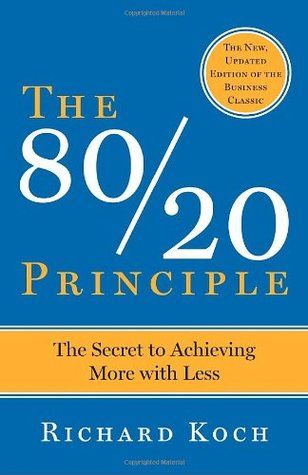The 80/20 Principle by Richard Koch

The book The 80/20 Principle: The Secret to Success by Achieving More with Less, has a title that is quite apt - because from beginning to end, it is about just that: The 80/20 Principle. So what is "The 80/20 Principle?" The 80/20 Principle, AKA The Pareto Principle, is a rule that states the following:
20% of inputs are responsible for 80% of outputs & conversely, 80% of inputs are responsible for 20% of outputs.
For example, when you apply this axiom to business, you may get a statement such as "20% of customers are responsible for 80% of income" or "80% of manufacturing faults come from 20% of issues," and so on. Now that you've read the rule, you might feel that it is a simple rule that doesn't require a whole 288 pages to explain, and you would be right.
But the author not only introduces us to the 80/20 principle, he explains its history, and its applications in the business world, while going on to argue and demonstrate that the principle can be applied to all areas of life, such as money matters, time management, and even happiness.
Although the first half of the book is devoted to the 80/20 Principle's applications in business and the corporate world, it is the second half of the book that I really enjoyed. In this half, the writer explores how to use the 80/20 Principle to enjoy life.
For example he talks about implementing a "Time Revolution." That is, instead of trying to "manage time" to get everything done, identifying the 20% of things that will give you the 80% of progress you need to make, and tackling those items. The author posits that when you begin to accord your time this way, you will find that there is no shortage of time to accomplish the things you want. This is just one of the many insights the book had to offer.
There were more insights: for managing finances, relationships, work, and happiness - that I will leave for you to find out, when you pick up this book: The 80/20 Principle by Richard Koch.